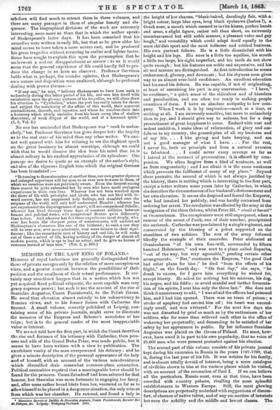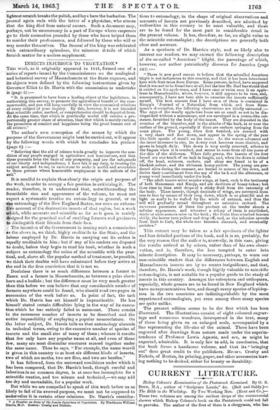MEMOIRS OF THE LAST KING OF POLAND.* MEMOIRS of royal
barbarians are generally distinguished from those of private savages only by the relation of more conspicuous vices, and a greater contrast between the possibilities of their position and the smallness of their actual performance. It cer- tainly may somethnes happen that in a nation which has not yet acquired fixed political etiquette, the most capable man may grasp supreme power ; but such is not the account of the rise of Stanislas Augustus, Count Poniatowski, to the Polish throne. He owed that elevation almost entirely to his subserviency to Russian views, and to his former liaison with Catherine the Second. A small volume, recently published at Leipzig, con- taining some of his private journals, might serve to illustrate the memoirs of the Empress and Scherer's anecdotes of her reign ; but is to the general reader of the most inappreciable value or interest.
We are not told how the first part, in which the Count describes -the rise and fortunes of his intimacy with Catherine, then prin- cess and wife of the Grand Duke Peter, was made public, but it seems to have been written with a view to publication. The exorbitant vanity of the man overpowered his delicacy ; and he gives a minute description of the personal appearance of the lady and of himself, with an account of the various misadventures which diversified their somewhat common-place connection. Political necessities required that a marriageable lover should be found for the princess. Count Zehadroff had been selected for that honour, but Stanislas was more fortunate in engaging her fancy, and, after some rather broad hints from her, ventured so far as to alloy/himself to be placed in a dangerous situation, the only retreat from which was her chamber. He entered, and found a lady in * Memoires Secrets et laddits de Stantstas Auguste, Comte Poniatowski, Dernier Rot Pologne, du Leipzig: Wolfgang Gerhard. 1552. the height of her charms, "black-haired, dazzlingly fair, with a.. bright colour, large blue eyes, long black eyebrows (lashes ?), a Greek nose, a mouth which seemed to invite kisses, perfect hands and arms, a slight figure, rather tall than short, an extremely unembarrassed but still noble manner, a pleasant voice and gay laugh," and versatility which could adapt itself equally to the most chi!dish sport and the most toilsome and critical business. His own portrait follows. He is a little dissatisfied with his height and his legs. His nose is a little too aquiline, his mouth a little too large, his sight imperfect, and his teeth do not show quite enough ; but his features are noble and expressive, and his air and manner are distinguished. At first introduction be seems embarrassed, gloomy, and downcast ; but his shyness soon gives way to an almost over-bold confidence. An excellent education had lessened his defects. He was capable, if not of originating, at least of sustaining his part in any conversation. " I have," he continues, " a quick sense of the ridiculous and of blunders and peculiarities, and am often too ready in making people conscious of them. I have an absolute antipathy to low com- pany. When I work it is by inspiration—much at a time, or nothing at all. I am extremely sensitive, but more to melancholy than to joy, and I should give way to sadness, but for a deep presentiment of great happiness to come. Endued with vast and ardent ambition, I make ideas of reformation, of glory and use- fulness to any country, the ground-plan of all my business and of my life. . . . I like giving and hate keeping, and am not a good manager of what I have. . . . For the rest, I never lie, both on principle and from a natural aversion to falsehood. . . . I could never carry revenge as far as I intend at the moment of provocation : it is effaced by com- passion. We often forgive from a kind- of weakness, as well as from magnanimity ; and I am afraid it is the same weakness which prevents the fulfilment of many of my plans." Beyond these portraits, the second of which is not always justified by the history, there is nothing which is interesting in the first part, except a letter written some years later by Catherine, in which she describes the circumstances of her husband's dethronement and her own elevation. It seems she despised and feared the Emperor, who had insulted her publicly, and was hardly restrained front ordering her arrest. The revolution waseffected by the army at the instigation of the three Orlows, whilst Peter III. " vivait et buvait" at Oranienbaum. The conspirators were still unprepared, when a rumour of the arrest of Pacik, one of their number, precipitated the outbreak. Catherine was proclaimed by a single regiment, and consecrated by the blessing of a priest supported on the shoulders of two soldiers. The rest of the army followed blindly the example of their comrades. Peter abdicated at Oranienbaum "of his own free-will, surrounded by fifteen hundred Holsteiners," and was sent to a place called Ropschai "out of the way, but very agreeable," pending certain other arrangements. "But," continues the Empress, "the good God bad other plans for him ;" he died "from the effects of his fright," on the fourth day. "On that day," she says, "he drank to excess, for I gave him everything be wished for, except liberty. He asked for nothing but his mistress, his dog, his negro, and his fiddle : to avoid scandal and farther fermenta- tion of his spirits, I sent him only the three last." She does not think it unnecessary to add, "I was afraid the officers had poisoned him, and I had him opened. There was no trace of poison ; a stroke of apoplexy had earned him off ; his heart was exceed- ingly small, and was withered." For the next few days she was not disturbed by grief so much as by the enthusiasm of her soldiers, who for some time relieved each other in the office of wakening her perpetually, and demanding to be satisfied of her safety by her appearance in public. By her influence Stanislas Augustus was placed on the throne of Poland. He must, how- ever, have owed it in part to his own popularity, that no voice of 25,000 men who were present protested against his election.
The second part of this volume consists of his private journal kept during his excursion in Russia in the years 1797-1798, that is, during the last year of his life. It was written for his family, and is almost totally devoid of interest, being a mere catalogue of civilities shown to him at the various places which he visited, with an account of the coronation of Paul I. If we can believe all the particulars, Russia must, even at that time, have been crowded with country palaces, rivalling the most splendid establishments in Western Europe. Still, the most glowing descriptions are perpetually underlaid with suggestions of discom- fort, of absence of native talent, and of any cotnection of interests bet ween the nobility and the middle and lowest classes. The lightest scratch breaks the polish, and lays bare the barbarian. The journal again ends with the letter of a physician, who attests that the king died from natural causes. Such a document may, perhaps, not be unnecessary in a part of Europe where emperors go to their coronation preceded by those who have helped them to murder their predecessors, and followed by those who will or may murder themselves. The funeral of the king was celebrated with extraordinary splendour, the minutest details of which furnish matter for a useless supplement.































 Previous page
Previous page